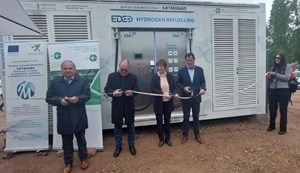News
Bulgaria's first hydrogen charging station inaugurated, a significant milestone towards green mobility
On May 10, 2024, Bulgaria celebrated a significant step towards green mobility with the inauguration of its first H2 charging station. Led by the Competence Center "HITMOBIL," this new facility could revolutionize the country's green transportation landscape.
Funded through the Operational Program "Science and Education for Smart Growth" 2014-2020 and the European Fund for Regional Development (ERDF), the station is a testament to Bulgaria's commitment to sustainable development. Situated within the "Integrated Energy Systems" field laboratory of the Competence Centre in Sofia, the station signifies the inception of H2 electric mobility in the country.
With an investment exceeding €10 MM, the Competence Centre has established six state-of-the-art laboratories. Among these, four are dedicated to industrial scientific research, while two serve as hubs for experimental development, equipped with facilities for field tests and demonstrations.
The ERDF has invested over €200 MM under the Operational Program "Science and Education for Intelligent Growth" 2014-2020. This funding facilitated the establishment of six centers of excellence and ten centers of competence, which will continue to be supported under the 21-27 programming period under the Program for Research, Innovation, and Digitalization for Smart Transformation.
The inauguration ceremony was attended by Academic Julian Revalski, Chairman of the Bulgarian Academy of Sciences, Professor Georgi Angelov, Deputy Minister of Innovation and Growth, and Dimitar Nedyalkov, Deputy Minister of Transport and Communications.
At its core, the "HITMOBIL" project aims to construct a comprehensive national and regional infrastructure conducive to the development, testing, optimization, and industrial integration of modern mobility and energy storage systems. Partnering with seven institutes of BAS, Neofit Rilski University of Applied Sciences, and the Association "BG H2 Society," the project epitomizes collaborative innovation towards a greener, more sustainable future.


